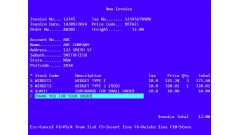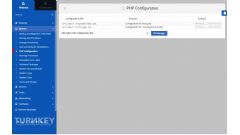ASP.NET Request object cheat sheet
by johna | August 8, 2014 | ASP.NET Web Forms Web Development
Personally I can never remember which of the Request object properties I need to use to get the requested URL or certain parts of the requested URL.
This cheat sheet lists the commonly used properties for this purpose, a description, and some examples of what possible values to expect.
Request.ApplicationPath
Returns the path relative to the website root.
/
Request.CurrentExecutionFilePath
Returns the path relative to the website root.
/test.aspx
Request.CurrentExecutionFilePathExtension
Returns the file extension of the requested page.
.aspx
Request.FilePath
Returns the path without querystring.
/test.aspx
Request.Path
Returns the full path without querystring.
/test.aspx
Request.RawUrl
Returns the full path and querystring.
/test.aspx?key=value
Request.PhysicalApplicationPath
Returns the file location of the website directory.
c:\wwwroot\
Request.PhysicalPath
Returns the page file name including file location.
c:\wwwroot\test.aspx
Request.QueryString
Returns the querystring without the leading question mark. If no querystring then returns an empty string.
key=value
Request.RequestType
Returns the request method as a string.
GET
POST
Request.Url
Returns the full URL including protocol, domain name, port (only if not 80), full path and querystring.
http://domain.com/test.aspx?key=value
http://domain.com:61615/Test.aspx?key=value
Request.Url.AbsolutePath
Returns the full path.
/test.aspx
Request.Url.AbsoluteUri
Returns the the full URL including protocol, domain name, port (only if not 80), full path and querystring.
http://domain.com/test.aspx?key=value
http://domain.com:61615/Test.aspx?key=value
Request.Url.Host
Returns only the host name (domain name including any requested sub-domain)
www.domain.com
my.test.domain.com
Request.Url.OriginalString
Returns the full URL including protocol, domain name, port, full path and querystring.
http://domain.com:80/test.aspx?key=value
Request.Url.PathAndQuery
Returns the full path and querystring.
/test.aspx?key=value
Request.Url.Query
Returns the querystring portion only, including the leading question mark. If there is no querystring then it returns an empty string.
?key=value
Request.Url.Scheme
Returns the protocol as a string.
http
https
Request.Url.Segements
Returns a string array of the path split by forward slashes.
{ /, folder/, test.aspx }
Important note regarding default pages
If the default page is requested without using the page name (ie. just the domain name or folder name) all of these methods except Request.RawUrl will still return the default page's name. If you need to know exactly what was requested use Request.RawUrl.
Important notes regarding querystrings
If the querystring is blank but a question mark was provided, all of these methods except Request.RawUrl will not include the question mark. If you need to know exactly what was requested use Request.RawUrl.
If a querystring key is requested but without equals sign and value, then all methods return the querystring exactly as entered, eg. ?key1=value&key2&key3=value.
Important note regarding upper and lower case in requests
Host names are always returned in lower case, regardless of how entered.
All methods return the case exactly as entered for the path and querystring, regardless of the actual case used for the physical folder or file name.
This cheat sheet lists the commonly used properties for this purpose, a description, and some examples of what possible values to expect.
Request.ApplicationPath
Returns the path relative to the website root.
/
Request.CurrentExecutionFilePath
Returns the path relative to the website root.
/test.aspx
Request.CurrentExecutionFilePathExtension
Returns the file extension of the requested page.
.aspx
Request.FilePath
Returns the path without querystring.
/test.aspx
Request.Path
Returns the full path without querystring.
/test.aspx
Request.RawUrl
Returns the full path and querystring.
/test.aspx?key=value
Request.PhysicalApplicationPath
Returns the file location of the website directory.
c:\wwwroot\
Request.PhysicalPath
Returns the page file name including file location.
c:\wwwroot\test.aspx
Request.QueryString
Returns the querystring without the leading question mark. If no querystring then returns an empty string.
key=value
Request.RequestType
Returns the request method as a string.
GET
POST
Request.Url
Returns the full URL including protocol, domain name, port (only if not 80), full path and querystring.
http://domain.com/test.aspx?key=value
http://domain.com:61615/Test.aspx?key=value
Request.Url.AbsolutePath
Returns the full path.
/test.aspx
Request.Url.AbsoluteUri
Returns the the full URL including protocol, domain name, port (only if not 80), full path and querystring.
http://domain.com/test.aspx?key=value
http://domain.com:61615/Test.aspx?key=value
Request.Url.Host
Returns only the host name (domain name including any requested sub-domain)
www.domain.com
my.test.domain.com
Request.Url.OriginalString
Returns the full URL including protocol, domain name, port, full path and querystring.
http://domain.com:80/test.aspx?key=value
Request.Url.PathAndQuery
Returns the full path and querystring.
/test.aspx?key=value
Request.Url.Query
Returns the querystring portion only, including the leading question mark. If there is no querystring then it returns an empty string.
?key=value
Request.Url.Scheme
Returns the protocol as a string.
http
https
Request.Url.Segements
Returns a string array of the path split by forward slashes.
{ /, folder/, test.aspx }
Important note regarding default pages
If the default page is requested without using the page name (ie. just the domain name or folder name) all of these methods except Request.RawUrl will still return the default page's name. If you need to know exactly what was requested use Request.RawUrl.
Important notes regarding querystrings
If the querystring is blank but a question mark was provided, all of these methods except Request.RawUrl will not include the question mark. If you need to know exactly what was requested use Request.RawUrl.
If a querystring key is requested but without equals sign and value, then all methods return the querystring exactly as entered, eg. ?key1=value&key2&key3=value.
Important note regarding upper and lower case in requests
Host names are always returned in lower case, regardless of how entered.
All methods return the case exactly as entered for the path and querystring, regardless of the actual case used for the physical folder or file name.
Related Posts
Another pointless project - the programmable digital watch
by johna | January 20, 2025
I've come up with yet another pointless project. Would you like a watch that you could program yourself - but not a "smart watch"?
Converting dBase IV programs to run in the browser
by johna | September 13, 2024
Some pointless entertainment trying to get some old dBase programs running in the browser.
How to set up a debugging using the Turnkey Linux LAMP stack and VS Code
by johna | December 19, 2023
The second part in my guide to setting up a website and database using the Turnkey Linux LAMP stack.




Comments
There are no comments yet. Be the first to leave a comment!